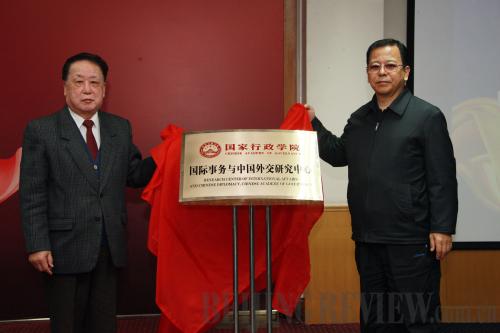|
 |
|
NEW THINK TANK: Former Chinese Ambassador to Germany Mei Zhaorong (left) and Yang Wenming, Director of the Socialism Research Center of the Chinese Academy of Governance, unveil the Research Center on International Affairs and Chinese Diplomacy, under the Chinese Academy of Governance, on November 19 in Beijing (CHINESE ACADEMY OF GOVERANCE) |
Fastest Computer
The world's fastest supercomputer, the Tianhe-2, began formal operations on November 20 at the National Supercomputing Center in Guangzhou in south China's Guangdong Province.
The supercomputer, capable of achieving 33.86 petaFLOPS, ranked number one on the TOP500, a list ranking the world's fastest supercomputers, which was updated at the SC13 supercomputing conference in Denver, the United States, on November 18. FLOPS stands for Floating Point Operation per Second, one floating point operation simply being one calculation, where as one petaFLOPS is equivalent to one quadrillion such calculations per second.
Developed by China's National University of Defense Technology in June, the supercomputer was shipped to Guangzhou in September and installed and tested for more than a month, according to sources working with the supercomputing center.
Tianhe-2, which translates to Milky Way-2 in English, has been successfully tested for various applications, such as weather simulations and gene sequencing, the center said.
It is almost twice as fast as the next computer on the list, the U.S. Department of Energy's Titan, which was clocked as performing 16.59 petaFLOPS.
Sanitary Toilets
An estimated 72 percent of households in rural China have access to sanitary toilets, the National Health and Family Planning Commission announced on November 19.
A previous survey in 1993 found only 7.5 percent of all rural households across the country had access to sanitary toilets. A national initiative to install toilets in rural areas was launched in 2004 to reduce incidences of infectious diseases.
According to a plan issued by the Chinese Government, 85 percent of rural households should have access to sanitary toilets by 2020.
A report by the UN Children's Fund and the World Health Organization in 2012 showed that 2.5 billion people in the world still practiced open defecation or lacked adequate sanitation facilities.
Attack in Xinjiang
Nine assailants were shot dead on November 16 after they killed two auxiliary police officers while attacking a police station in northwest China's Xinjiang Uygur Autonomous Region, local police revealed.
The nine assailants, wielded knives and axes when they attacked the police station in Serikbuya Township in Bachu County of Kashgar Prefecture at around 5:30 p.m.
Two police officers were injured in the attack.
Social order has been restored, police said, without providing further details.
Air Quality
Density of the key air pollutants PM2.5 and PM10 increased in China by 46.2 percent and 39.6 percent respectively in October, environmental watchdogs announced on November 19. The Ministry of Environmental Protection attributed the rise to seasonal changes.
Nearly half of the 74 major Chinese cities monitored nationwide saw air quality for more than 50 percent of October failing to meet ministry standards.
Air quality in south China's Pearl River Delta reported a marked drop compared with September, mainly due to less rain and more sunshine. The density of PM2.5 and PM10 increased 89.5 percent and 73.8 percent, respectively.
The nine monitored cities in the Pearl River Delta averaged about 24 days below the standard, while the national average stood at around 15 days.
In September, a government plan to tackle air pollution was announced, listing efforts to cut coal consumption, shut down polluters and promote cleaner production. The plan also aims to cut the density of inhalable particulate matter by at least 10 percent in major cities nationwide by 2017.
| 